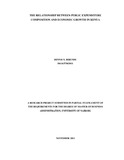| dc.description.abstract | Existing studies on the relationship between public expenditure and economic growth have shown conflicting results over time. This means that there is no clear explanation for this relationship. Kenya has also experienced an increase or demand of increase of expenditures in various sectors like that education and health due to strikes by workers for an increase in their salaries. This study therefore examined the relationship and dynamic interactions between the composition of government expenditures and economic growth in Kenya. Real Gross Domestic Product (RGDP) was used as a proxy for economic growth in the study. The analytical technique of ordinary least squares and Granger Causality were exploited. The study used secondary data spanning from 1970 to 2012. The findings showed that government expenditure on transport and communication, health and education are positive determinant of economic growth on the other hand government expenditure on agriculture, low and order, defense and general administration have a negative impact on economic growth. The study therefore recommended among others that: there should be effective channeling of public funds to productive activities, which will have a significant impact on economic growth. Reviews was used in the analysis of the data. | en |

